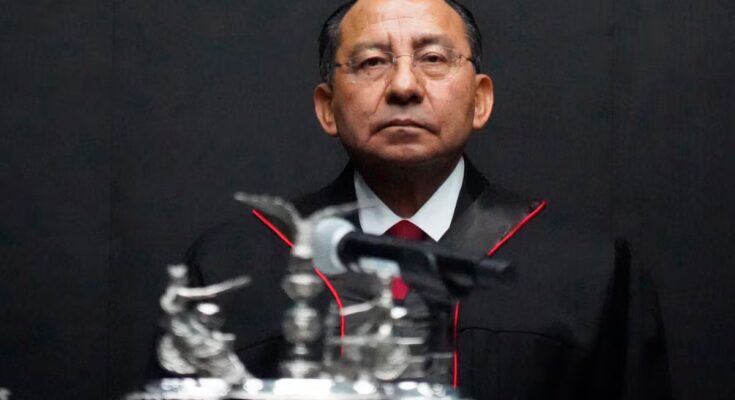At 2.30pm this Friday, all possibilities for change within the Superior Court of Justice (TSJ) in Mexico City were destroyed. Its powerful president, Rafael Guerra, was re-elected for a third term as head of the highest court of local power. Despite efforts by at least two justices to present himself as an alternate option, Guerra won support from 60 of the 79 justices. That was enough, the 53 yeses were enough for him. The result was not surprising in a union that knows perfectly well the jurist’s closeness to the Minister of the Interior, Rosa Icela Rodríguez, to the minister Yasmín Esquivel or to the former president Andrés Manuel López Obrador. “It’s party discipline,” summarizes a source close to the TSJ. Guerra will serve until 2027, when the position will go to the polls in a judicial election.
Guerra’s detractors thought this Friday marked the end of his reign. The brutal murder of lawyer David Cohen at the gates of the Courthouse and the 34-day workers’ strike seemed the perfect examples to demonstrate the “chaos” that the president had created in the heart of the local judiciary. Also this morning, a few moments before the vote, a group of employees came out to protest against his possible re-election. However, neither the violence nor the delay in the dossiers were enough to remove what many define as a key operator of some of Morena’s heavyweights from his seat and, therefore, from power.
Guerra, 63 years old and with three decades of experience as a judge, was part of the team that assisted López Obrador in the immunity case, when he was already a local judge. His close relationship with Rosa Icela Rodríguez also allowed him to be close to President Claudia Sheinbaum, when she was still head of government in Mexico City and Rodríguez was her cabinet secretary. Guerra decided to run for president of the TSJ in the 2018 election, just as the pieces were falling into place. No one has taken it off since.
He himself tried to get out of it, to become minister of the Supreme Court of Justice of the Nation (SCJN), within the framework of judicial elections. However, he was rejected because he did not achieve an academic average of 8 (he had a 7.4), one of the mandatory requirements for all applicants. Already then it became known that there was pressure on the Evaluation Committee to try to “make a convenient interpretation” around his average and round it to eight, which would have allowed him to appear. It didn’t work. The Committee was imposed the criterion of not ignoring its non-compliance and this put it out of business.
In exchange, his wife, Verónica de Gyves, who was a member of the Federal Council of the Judiciary, received the automatic pass for the election of the Disciplinary Tribunal. Even though she wasn’t running for any charges. Subsequently, her name appeared on the accordions that Morena prepared to lead the vote and she was elected to the body responsible for monitoring the judges.
This movement has overshadowed the result that Guerra achieved with his magistrates in the local judicial elections. The reform of the Constitution provided that by June 2025 half of the seats of local and federal judges and magistrates would go to the polls. Judge Celia Marín told EL PAÍS that Guerra did not respect the proportion and sent only 34 of 79 magistrates and 98 of 400 judges. “It was a personal decision. He knew that the election for president of the court was approaching and that if he had governed all the seats he could have lost the majority that had been guaranteed until then”, underlined Marín.
The names he sent to the polls were Guerra’s trusted figures. However, the vast majority were not elected on June 1. Their names were not on the accordions. This was interpreted in judicial circles as a loss of influence by the local TSJ president. However, this Friday, Guerra proved that his power is still intact. He obtained 60 supports, well above the 10 obtained by Rosalba Guerrero; the six by Alejandro Sentiés and the only one that Celia Marín made. “They are signs of power,” says a source.
Yasmín Esquivel was the first to congratulate the jurist on this new stage: “I wish him success in this task, which represents a fundamental responsibility to strengthen trust.” The minister obtained favorable rulings from some local judges when she fought for the authorship of her degree thesis. Her judicial broadside against the National Autonomous University of Mexico (UNAM) – to prevent the ruling on who had plagiarized her law degree work from coming to light, whether she or a student who had submitted the same paper but a year earlier – received the support of several resolutions from Mexico City judges, who concluded that Esquivel had not plagiarized due to the age of the paper.
“My greatest gratitude for every message and demonstration of support I have received on social networks. Your trust and your company motivate us to continue working. Thank you for your generosity and for walking alongside the judiciary of Mexico City,” wrote Rafael Guerra on his X account, which promised to “strengthen workers’ rights, promote gender equality, advance digitalization and consolidate oral, transparent and human-faced justice.”



